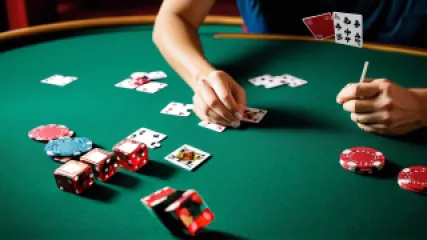Mastering Behavioral Therapy for Gambling Addiction
Introduction
Gambling addiction is a serious issue that affects millions of people worldwide. It can lead to financial ruin, strained relationships, and overall negative impacts on one's mental and emotional well-being. However, there is hope for those struggling with gambling addiction through the use of cognitive behavioral therapy (CBT).
In this ultimate guide to mastering behavioral therapy for gambling addiction, we will explore the principles of CBT, its effectiveness in treating gambling addiction, and practical strategies for overcoming this destructive behavior. Whether you are someone personally struggling with gambling addiction or a professional seeking to help others, this guide will provide valuable insights and tools to support your journey towards recovery.
Understanding Gambling Addiction
Before delving into the specifics of behavioral therapy for gambling addiction, it is essential to have a comprehensive understanding of the nature of this disorder. Gambling addiction, also known as compulsive gambling or pathological gambling, is characterized by the inability to resist the urge to gamble despite the negative consequences it brings.
Individuals with gambling addiction often experience a sense of thrill and excitement while engaging in gambling activities. This pleasurable sensation reinforces the behavior, leading to a cycle of compulsive gambling. Over time, the addiction escalates, and individuals may find it increasingly difficult to control their gambling impulses.
It is crucial to recognize that gambling addiction is not simply a matter of poor self-control or willpower. Like other addictions, it has underlying psychological, biological, and environmental factors that contribute to its development and persistence. This understanding forms the basis for utilizing cognitive behavioral therapy to address gambling addiction effectively.
The Principles of Cognitive Behavioral Therapy
Cognitive behavioral therapy (CBT) is a widely recognized and evidence-based therapeutic approach that focuses on identifying and modifying unhelpful thoughts, emotions, and behaviors. It is based on the premise that our thoughts influence our feelings and actions, and by changing our thoughts, we can change our behaviors and experiences.
When applied to gambling addiction, CBT aims to challenge and reframe distorted beliefs and perceptions about gambling, develop coping skills to manage cravings and triggers, and promote healthier thought patterns and behaviors. The therapy typically involves a combination of individual counseling sessions, group therapy, and the use of therapeutic tools and techniques.
The Effectiveness of CBT for Gambling Addiction
Research has consistently shown that cognitive behavioral therapy is highly effective in treating gambling addiction. A meta-analysis conducted by the National Council on Problem Gambling found that CBT significantly reduces gambling behavior, decreases gambling-related problems, and improves overall well-being among individuals with gambling addiction.
CBT helps individuals develop awareness of their gambling triggers, such as certain places, people, or emotions, and teaches them alternative ways to cope with these triggers without resorting to gambling. By targeting the underlying thoughts and beliefs that drive gambling behavior, CBT empowers individuals to regain control over their actions and make healthier choices.
It is important to note that CBT is not a one-size-fits-all approach. Each individual's journey towards recovery is unique, and therapy should be tailored to their specific needs and circumstances. A skilled therapist will conduct a thorough assessment and work collaboratively with the individual to create a personalized treatment plan.
Practical Strategies for Overcoming Gambling Addiction
While working with a qualified therapist trained in CBT is crucial for overcoming gambling addiction, there are also practical strategies that individuals can implement in their daily lives to support their recovery:
- Identify and avoid triggers: Recognize the situations, places, or emotions that typically lead to gambling urges and take proactive steps to avoid or minimize exposure to these triggers.
- Develop alternative activities: Engage in activities that provide a similar sense of excitement or relaxation as gambling. This could include hobbies, sports, exercise, or spending quality time with loved ones.
- Practice self-care: Take care of your physical and emotional well-being by getting enough sleep, eating nutritious meals, exercising regularly, and seeking support from friends, family, or support groups.
- Set realistic goals and track progress: Establish achievable goals for reducing or quitting gambling and track your progress. Celebrate small victories along the way to stay motivated and reinforce positive changes.
- Create a support network: Surround yourself with understanding and supportive individuals who can offer encouragement and help you stay accountable in your recovery journey.
Seeking Professional Help
While self-help strategies and support networks are valuable, it is important to recognize when professional help is necessary. If gambling addiction is significantly impacting your life, relationships, or financial stability, seeking guidance from a trained therapist or counselor is highly recommended.
Qualified professionals specializing in gambling addiction can provide individualized treatment plans, offer support, and teach valuable coping skills. They may also recommend additional resources such as support groups, online forums, or specialized programs tailored to gambling addiction recovery.
Conclusion
Mastering behavioral therapy for gambling addiction is a transformative journey that requires commitment, self-reflection, and the support of trained professionals. Cognitive behavioral therapy offers a powerful framework for understanding and addressing the underlying causes of gambling addiction, empowering individuals to regain control over their lives.
By combining the principles of CBT with practical strategies and a strong support network, individuals can overcome the grip of gambling addiction and build a healthier, more fulfilling future. Remember, seeking help is a sign of strength, and with the right resources and support, recovery from gambling addiction is possible.
Source






